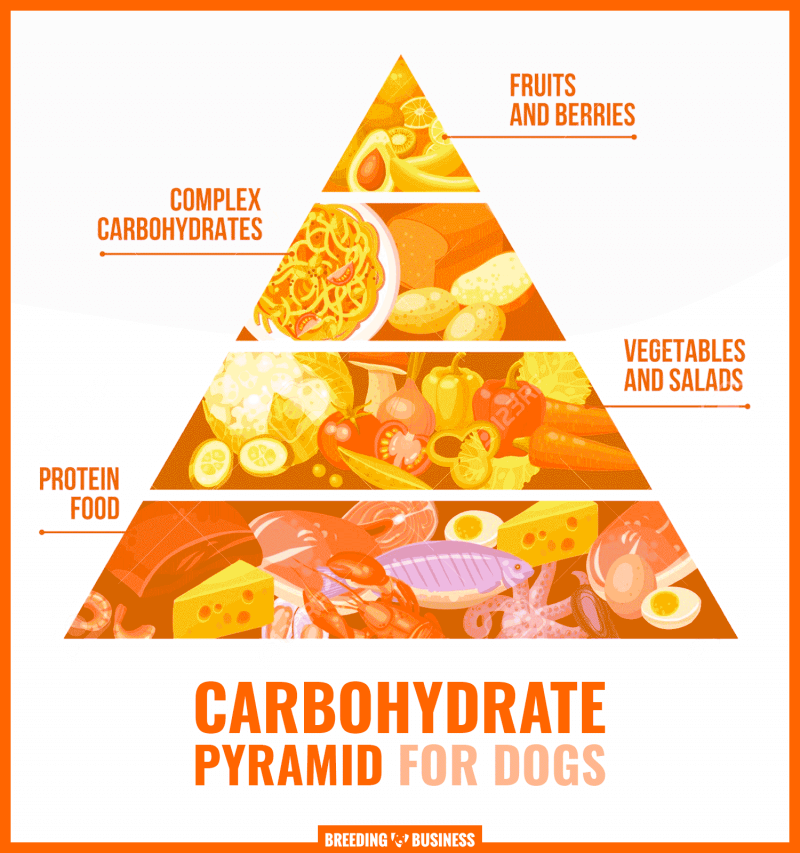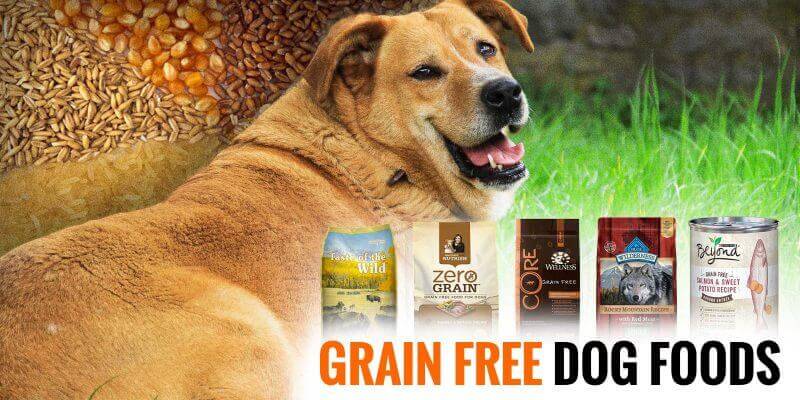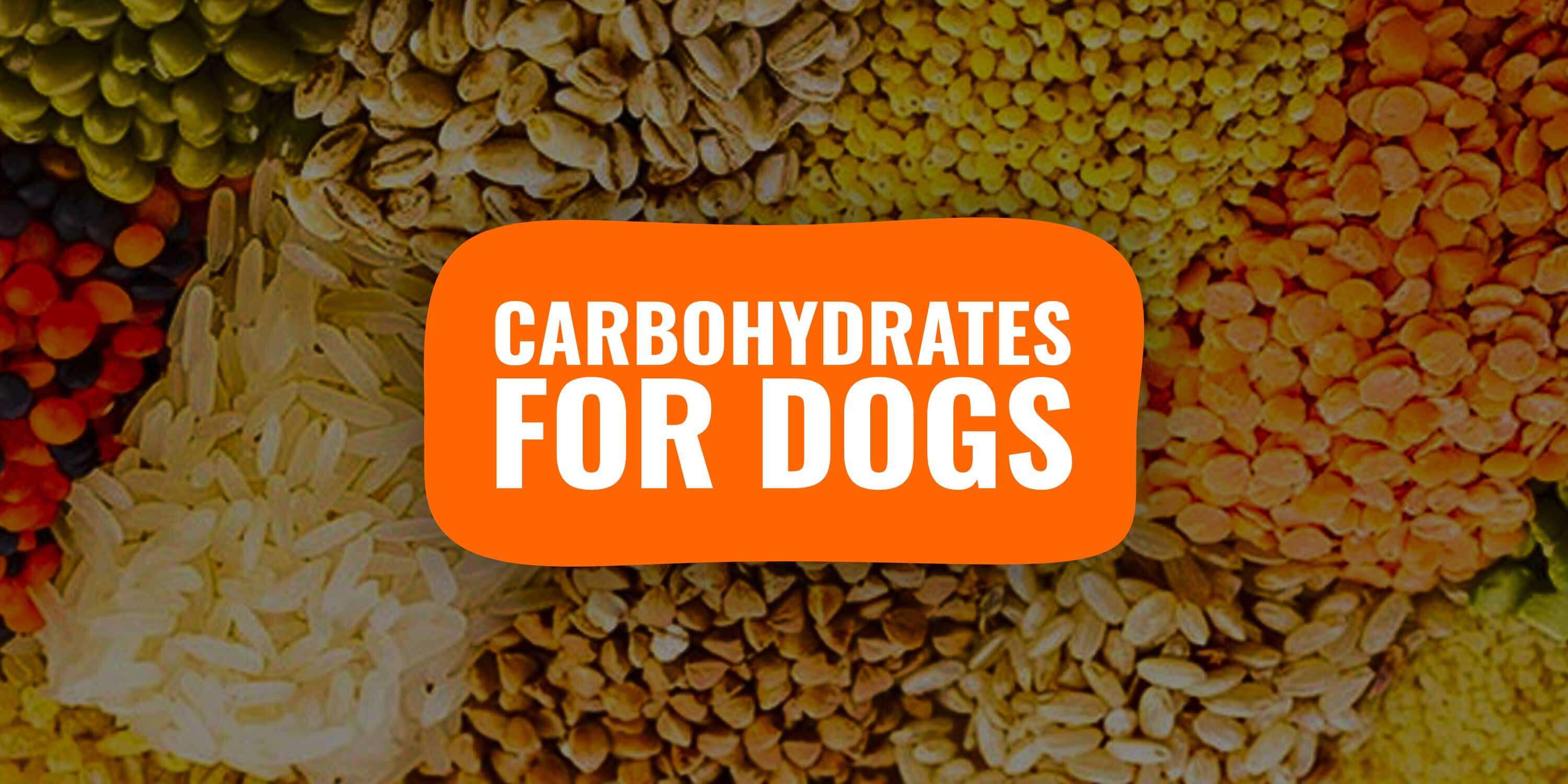Carbohydrates for dogs are used as a way to provide energy that would be burned while exercising. Dogs do not have a physiological need for carbs and can perfectly live without them. Yet, we find carbs for dogs in nearly all single commercial pet foods.
In fact, carbohydrates are cheap to grow, yield, and package. Grains such as barley, malt, corn, wheat, or rice, all cost very little to make for pet food manufacturers. It’s an easy filler when compared to quality chunks of meat or essential fatty acids. Consequently, dog food brands favor carbs for dogs without purely as a profitable move for the company. The dog’s health is not a priority – otherwise, they would use fewer carbs, and more fats and proteins!
With low-carb ketogenic catching on and us humans going off carbohydrates to be fit, is it advisable to continue giving your dog their daily dose of carbs?
What are carbohydrates for dogs?
Carbohydrates are nutrients that represent a long chain of glucose – e.g. fibers, starches. They break down inside the body to convert into sugars or simple glucose. This stored glucose is expended as energy, to run many of a dog’s body’s functions. Put simply, carbohydrates work as fuel in dogs. While not essential for nutrition, carbs help dogs in a lot of ways. The dietary fibers and roughage in foods also aid healthy bowel movements in dogs.
Adding complex carbohydrates (e.g. sweet potatoes) provides dogs with carbs that take more time to be digested. Therefore, complex carbs are used throughout the day rather than spiked after the meal. Complex carbohydrates keep dog fuller for longer and prevent immediate storage of the unused glucose. Indeed, a healthy dose of complex carbohydrates creates an energy store for the dogs. For pregnant and lactating mothers, these energy stores can ease the birthing process and help raise a healthy litter of puppies.
Why are most dog foods high in carbohydrates?
Most commercial dog foods contain a lot of carbohydrates, which are not essential for a dog’s diet. Carbs are cheaper to produce than other nutrients, such as proteins and fats. Manufacturers use grains and their byproducts to make dog food because they are widely available and cost-effective. Carbs have a long shelf life and are easy to shape into different forms, such as kibble and stars.
However, there are no laws requiring manufacturers to list the nutritional content of dog food, which means that you may not know how many carbs your dog is eating. There are also no guidelines on how much carb is appropriate for dogs, so manufacturers can add as much as they want. Additionally, the term “carbohydrate” is not well-defined, so manufacturers may use it for marketing purposes even if the actual ingredients are not true carbohydrates.
Do dogs need carbohydrates in their diet?
It is true that dogs do not need carbohydrates to survive, but they can benefit from them. Carbohydrates serve as a secondary energy source for dogs, allowing their bodies to conserve protein for essential functions such as immune system support, cell repair, digestion, and amino acid production.
Instead of relying on starchy or refined carbohydrates, low-carb diets that emphasize roughage and dietary fiber are ideal for dogs. If feeding your dog starchy or refined carbs, be sure to control the portion size and cook them thoroughly, as dogs cannot consume raw carbohydrates.

In summary, while dogs do not require carbohydrates for survival, they can benefit from them as a secondary energy source. A low-carb diet that emphasizes fiber and roughage is best, and starchy or refined carbs should be consumed in moderation and cooked thoroughly.
What are the differences between glucose and carbohydrates?
Carbohydrates are a type of nutrient that the dog’s body breaks down into glucose. Glucose is then used for energy during daily activities. Any excess glucose that is not used up gets stored as fat in the dog’s body.
Wild canines like wolves, coyotes, and jackals get their energy from protein and fat in their diet, as they don’t have access to carbohydrates. These nutrients get converted into glucose through a process called glycogenesis.
The difference is that carbohydrates are broken down and converted into glucose faster than proteins and fats. This means that glucose is stored as fat more quickly than lipids and proteins.
Are complex carbs healthier for dogs?
Carbohydrates are nutrients that are eventually converted into glucose, whether they are simple or complex. Complex carbohydrates take longer to break down and provide energy over a longer period of time. They also contain more essential nutrients such as vitamins, fiber, and minerals, which are important for overall health.
The main difference between simple and complex carbs is that simple carbs provide instant energy but may lead to obesity and health issues in dogs if not used up immediately. This is because any unused energy is stored as fat in the body. On the other hand, complex carbs provide a steady source of energy and are a healthier choice for dogs.
If your dog needs a quick energy boost before playing or running, a snack or treats with simple carbs is a good choice. However, if your dog will not be exercising for a few hours, a meal with complex carbs is a better option for their overall health.
Are grain-free dog foods good for dogs?
Grain-free dog foods are great for your dog, especially if you suspect that they are prone to food allergies. If your dog shows signs of indigestion, flatulence, ear infections, skin problems, or itching, it is probably time to go grain-free.
However, grain-free doesn’t necessarily mean carb-free. Most grain-free foods and kibbles contain potatoes, corn, and other starchy vegetables with high carb content. So if you’re planning on going grain-free to cut carbohydrates, be very careful of your food selection.
The reason many people are taking their dogs off grains is that a canine primitive diet does not demand grain. The canine digestive system hasn’t evolved much over time. So considering its ancestral canine diet of hunted, raw meat, there’s no room for grains at all.
Having said that, make the switch to grain-free foods gradually. That way if your dog shows signs of illness or malnutrition or loses their sheen, you’ll know that they are more comfortable on grains than without it.

Can dogs safely digest starches?
It’s essential to break down and digest starches properly, and this process requires an enzyme called amylase. While humans have amylase in their saliva, dogs produce it in their pancreas. Dogs begin digesting starches in their small intestine.
Starchy foods, like bread, are high in calories because they have concentrated carbohydrates. But, these foods also provide fiber, phytonutrients, and essential vitamins and minerals. It’s crucial to be careful about how much starch you’re feeding your dog. Consult with a veterinarian to determine an appropriate amount of starch for your dog’s diet
What are the healthiest carbohydrates for dogs?
Healthy carbs for dogs are those with a low GI, coming from foods containing antioxidants and lots of fiber. Carbohydrates for dogs must also be packed with nutrients that the dog will, otherwise, not derive from meats
Fresh fruits
Recommended fresh fruits for dogs include apples, bananas, and watermelons. All without seeds. Fruits tend to release sugar quickly in the bloodstream, thus keeping energy levels high during active sessions. They also contain enough fiber to fulfill their dietary fiber needs. Fresh fruits are great sources of vitamins and minerals so when looking for healthy carbs, they come highly recommended.
Vegetables
Recommended vegetables for dogs include cauliflower, broccoli, potatoes, green beans, sweet potatoes, and cabbage. Try to use organic veggies and make sure you serve these steamed to unlock their nutritional potential. Raw veggies might be harder to digest resulting in more harm than good.
Cheese
Although cheeses have very little carb content, if your dog can tolerate lactose, a bit of hard cheese can be really good for them on a low-carb diet. Plus, you can easily dice up a block of cheese and use small chunks as super healthy single-ingredient training treats.
How to find hidden carbs in commercial dog food?
Check the Guaranteed Analysis table on your dog food packet. This table shows the minimum amount of nutrients the food contains. This means that the food may contain more nutrients, but definitely not less than what is mentioned on this table.
Note down the percentage of protein, fat, moisture and ash. Write these down and subtract it from 100. This will give you the carb content in the food.
Dog food is made up of the above components – deducting the rest of them gives you an approximate value of carbs, as manufacturers don’t mention carb content on their packaging.
Feeding your dog home-cooked meals is the best and most sure shot way of ensuring that the food in his system has no carbs at all.
However, if cooking at home every time isn’t possible, raw foods are also an option. BARF – biologically appropriate raw food is a practice that promotes feeding your pets raw muscle meats and edible bones alongside fruits and veggies.

One comment on “Carbohydrates for Dogs – Requirements, Pros & Cons”
So, if ketones in humans have been researched more now and found to be a BETTER Source of energy than carbs, etc. etc… then why would you think that dogs need carbs for energy ? If it’s not an essential nutrient to live, then that’s likely because they’re designed by our creator, to not need carbs, which means our creator, knowing the dog will need energy, wouldn’t of simply forgotten to design it that way.
So, in short, I’m sure the dogs will also thru ketones or other similar system, use fat for energy and really not need any carbs.. maybe traces like keto diet, thru carrots, other veggies… but if ketones are being discovered to be powerful healing and better health in humans, then well…. I’m sure our carnivore best buddies will flourish with a keto diet too.
I hope more research is done, so we can get a better answer to this.
Nutritionists are likely just going by what they’ve been taught and until new research confirms carbs are not needed at all, they’ll just go with the flow, that carbs are needed.
I don’t buy it.